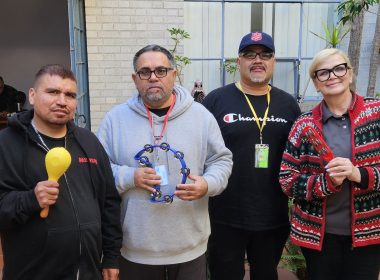By Linda Bond, Commissioner –
Recognizing that the future is always shaped by present activity, Commissioner Linda Bond has identified a six point strategy to “make the future in the present.”
1. Make the field a priority
 “I want to publicly announce to the territory tonight that for the next two years you will give emphasis to this–you will make the field a priority,” Bond stated. In relation to this, emphasis will be given to “pruning” that which goes beyond financial non-viability and strategizing what needs to be done for corps planting.
“I want to publicly announce to the territory tonight that for the next two years you will give emphasis to this–you will make the field a priority,” Bond stated. In relation to this, emphasis will be given to “pruning” that which goes beyond financial non-viability and strategizing what needs to be done for corps planting.
2. Promote holistic ministry
“The Salvation Army is holistic ministry,” the commissioner stated, noting that: corps ministry should be integrated with worship and community service; soldiers should be personally involved in corps and service ministry; an integrated social services should respond to the whole person–spiritual, physical, emotional, and social.
 3. Make ministry to youth a priority
3. Make ministry to youth a priority
As a part of this, every corps will have an evangelistic outreach program for children; new initiatives relevant to youth will be seen in corps programs; emphasis will be given to discipling and training; and selection and training of youth leaders will be a priority.
4. Cast a global vision
“We are our brother’s keeper,” Bond said. “The leadership team is committed to casting a global vision. We want to underscore the Army’s goal of ‘the world for God’ and consider world evangelization to be a realistic vision.”
We celebrate the internationalism of The Salvation Army through: financial giving, overseas service, mission teams, training of national officers, and prayer support. “Let’s give sacrificially, not only of money, but of our people, our expertise and our hospitality.”
Bond also said that we must cast a global vision for the “world at our door,” and admitted that “This TC’s going to learn Spanish!”
5. Identify, train & develop leaders
She noted “The greatest need of every organization in the world to meet the challenges of the 21st century is leadership. The material produced for Vision 2000 and Beyond has underscored this as an urgent matter. It is vital that we act now.”
As part of this process: We need to look at every aspect of our Army, with present and future needs for leadership. We need to determine the officer requirements and the use of lieutenants. Those who are unproductive and ineffective need to be mobilized and motivated. Some who have resigned need to be invited back. Employee leadership positions need to be evaluated as well, in order to involve those with expertise to “buy into” our mission. In addition, Crestmont College will play a vital role in ongoing leadership development needs.
 6. Direct resources to mission
6. Direct resources to mission
“We must find ways to use every resource so effectively that the Army fulfills its purpose,” Bond said. That includes:
Producing a grid of questions for assisting us in making mission-based decisions, this may influence decisions as to whether we spend the money, construct the building, approve the program, or produce another regulation.
Reviewing policies and procedures with a view to simplifying, reducing, and delegating authority.
Reducing administrative costs.
Raising, investing and distributing funds according to mission objectives.
“If I have a personal dream for this territory, it would be a Spirit-led, progressive, growing movement with a burning passion for our mission. I will cry out to God for leadership that is ‘known to be filled with the Spirit,’ for an Army that prays powerfully, loves community and is nourished by the Word.”










